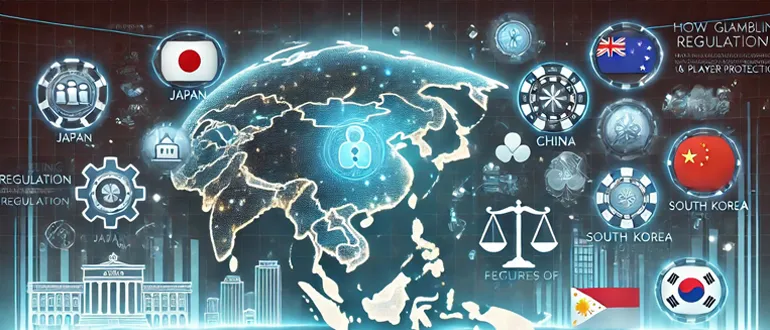
Gambling is part of the culture in many countries, and attitudes toward it vary significantly across Asia. While some countries have legalized and state-regulated gambling, others prohibit it entirely. This regulatory diversity stems from cultural, religious, and economic differences across regions. In this article, as an expert in gambling, I will explain how gambling regulation works in Asia, which countries have legalized casinos, and what measures are in place to protect players’ interests.
Features of Gambling Regulation in Asia
Gambling regulation in Asia is a complex and varied system that depends on each country’s laws, as well as cultural and religious traditions. Some countries impose a complete ban on gambling, others allow it only in special zones, and some have partial legalization.
Total Gambling Ban
Several Asian countries prohibit gambling entirely due to cultural, religious, and social stability concerns.
- Saudi Arabia and other Gulf states: In Islamic-majority countries, gambling is banned on religious grounds, as Islam prohibits participation in gambling.
- India (some states): Most Indian states ban gambling, with exceptions for certain lotteries and horse racing. However, regulations vary by region.
Partial Legalization of Gambling
Some countries permit gambling only in special zones or under specific conditions, making regulation complex and diverse.
- China (Macau): Gambling is banned in mainland China except in the special administrative region of Macau, which has become the world’s largest gambling hub. Macau attracts millions of players worldwide and is strictly regulated by authorities.
- South Korea: Casinos are legal, but most are open only to foreign citizens. Locals may visit only one casino, helping control gambling’s societal impact.
Full Legalization of Gambling
Some countries have legalized and state-regulated gambling, allowing industry oversight, player protection, and tax revenue generation.
- Philippines: Casinos are regulated by PAGCOR (Philippine Amusement and Gaming Corporation), which oversees all gambling aspects and operates state-run casinos.
- Singapore: Gambling is legal and strictly regulated. Major casinos like Marina Bay Sands and Resorts World Sentosa operate there, with locals required to pay an entry fee to prevent gambling addiction issues.
Key Regulatory Bodies in Asia
Gambling regulation in Asia is managed by various authorities depending on the country. These bodies handle operator licensing, activity monitoring, and player safety.
1. PAGCOR (Philippines)
PAGCOR is a government agency regulating gambling in the Philippines and also operates state casinos, making it a major player in the industry.
PAGCOR’s Functions:
Licensing and oversight: PAGCOR licenses private and state casinos and strictly monitors their operations.
Responsible gambling: The agency actively promotes addiction prevention measures and requires operators to provide self-control tools.
2. Macao Gaming Inspection and Coordination Bureau (DICJ)
Gambling in Macau is regulated by local authorities, with licensing and oversight handled by the DICJ.
Macau’s Regulatory Features:
- Strict licensing requirements: Casino operators must meet stringent criteria, including financial stability and security standards.
- Anti-money laundering efforts: Macau actively collaborates with international organizations to prevent money laundering and illegal activities in gambling.
3. Singapore Casino Regulatory Authority (CRA)
Singapore’s gambling industry is regulated by the CRA, which ensures compliance with all gaming laws and rules.
CRA’s Functions:
- Operator licensing: The CRA licenses casino operators and verifies their compliance with safety and fairness standards.
- Responsible gambling oversight: Singapore emphasizes addiction prevention, requiring casinos to offer self-exclusion tools and charging locals an entry fee.
Online Gambling Regulation in Asia
Online gambling regulation also varies widely across Asia, with some countries banning it entirely, others allowing it partially, and some imposing restrictions.
Complete Online Gambling Bans
Some Asian countries block access to gambling sites entirely.
- China: Online gambling is banned, and access to such sites is strictly blocked.
- India: Most states prohibit online gambling, though some, like Sikkim and Goa, allow limited forms.
Partial Online Gambling Legalization
Some countries license select operators meeting strict requirements.
- Philippines: PAGCOR licenses online casinos serving players outside the Philippines, while domestic access is restricted.
- Singapore: Online gambling is partially permitted through state lotteries and sports betting, but private online casinos remain banned.
Open Markets
Some Asian countries allow online casinos licensed in other jurisdictions to operate with minimal restrictions.
Cambodia: Private operators licensed abroad serve local players with relatively lax state oversight compared to neighboring countries.
Player Protection and Responsible Gambling Measures in Asia
Asian countries implement various measures to protect players and mitigate gambling’s negative effects. Legalized markets emphasize responsible gambling policies.
Some countries impose entry fees for locals to restrict casino access and prevent addiction.
Singapore: Locals must pay significant entry fees to visit casinos as part of gambling addiction controls.
Casinos must provide tools for setting deposit and time limits, helping players manage spending and avoid excessive gambling.
Many countries allow players to self-exclude, temporarily or permanently restricting their access to gambling if they recognize problematic behavior.
Conclusion
Gambling regulation in Asia is a complex system where each country approaches the issue differently based on cultural, religious, and economic factors. Some nations impose total bans, while others allow gambling under strict controls in designated areas. Regulatory bodies like PAGCOR, DICJ, and CRA oversee operators and protect player interests. When choosing a casino or online platform in Asia, it’s crucial to consider local laws to ensure legality and safety.












